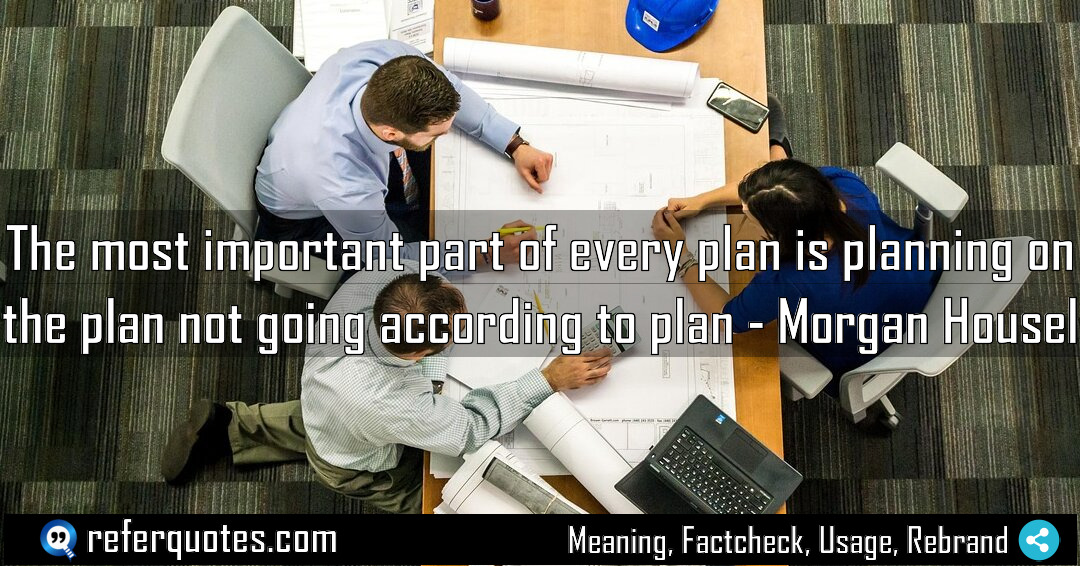
You know, the most important part of every plan is planning for it to fail. It sounds counterintuitive, but it’s the secret to real-world success. Let’s break down why Morgan Housel is so right about this.
Share Image Quote:
Table of Contents
Meaning
At its core, this quote means that the true value of planning isn’t in creating a perfect, linear path, but in building a robust system that can withstand the inevitable deviations from that path.
Explanation
Look, I’ve seen this play out a hundred times. The teams that succeed aren’t the ones with the most beautiful, detailed Gantt charts. They’re the ones who have already asked the question, “Okay, but what if our main supplier goes out of business?” or “What if the market tanks right after we launch?” That’s the real planning. It’s the planning you do *around* the plan. It’s about building buffers, having contingency funds, and developing a mindset that doesn’t see a change in direction as a failure, but as a simple, expected part of the process. The plan itself is almost a formality; the real work is in the stress-testing.
Quote Summary
Reading Level55
Aesthetic Score60
Origin & Factcheck
This gem comes straight from Morgan Housel’s fantastic book, The Psychology of Money, which was published in 2020. You’ll sometimes see this idea floating around the internet attributed to military strategy or Sun Tzu, but nope, this specific phrasing is all Housel. He has a real talent for distilling complex truths about risk and behavior into simple, punchy statements.
Attribution Summary
Where is this quotation located?
| Quotation | The most important part of every plan is planning on the plan not going according to plan |
| Book Details | Publication Year: 2020; ISBN-10: 0857197681; ISBN-13: 978-0857197689; Pages: 256 (approx.) |
| Where is it? | Unknown chapter / page |
Context
In the book, Housel uses this concept to talk about financial planning. He argues that no financial plan survives its first contact with reality—a job loss, a medical emergency, a surprise boom. So, the smartest thing you can do is plan on your plan being wrong. It’s about embracing uncertainty instead of pretending it doesn’t exist.
Usage Examples
So how do you actually use this? It’s a mindset shift. For project managers, it means building slack into your timelines and having a Plan B for your most critical tasks. For investors, it means having an emergency fund so you don’t have to sell stocks at a market bottom. For entrepreneurs, it means knowing that your first business model is probably wrong, and that’s okay. You’re not failing; you’re just collecting data for the *real* plan. This quote is pure gold for anyone in a leadership role, anyone building a business, or honestly, anyone just trying to navigate their career without having a nervous breakdown when things go sideways.
To whom it appeals?
Share This Quote Image & Motivate
Motivation Score60
Popularity Score75
Shareability Score70
FAQ
Question: Doesn’t this encourage lazy planning?
Answer: Not at all. It’s the opposite. It forces you to do the *harder* work of thinking critically about potential failures, which ultimately leads to a much more resilient and thoughtful plan.
Question: Is this the same as having a “Plan B”?
Answer: It’s bigger than that. A Plan B is a specific alternative. This is about cultivating a flexible, adaptive mindset where you’re psychologically and strategically prepared for multiple outcomes, not just a single alternative.
Question: Who benefits most from this idea?
Answer: Honestly, everyone. But it’s absolutely critical for leaders, investors, entrepreneurs, and anyone working in a fast-changing, unpredictable field. It’s the difference between being rigid and being robust.
Similar Quotes
Every plan is only as good as your ability to stick to it when things go wrong. This is the brutal truth about strategy that most people ignore. It’s not…
You know, “The key to success is action” isn’t just a nice saying. It’s the brutal truth I’ve seen play out again and again. Without that first step, even the…
You know how we make plans assuming best-case scenarios? That’s the planning fallacy in a nutshell. It’s why we’re always running late and projects blow past deadlines. We’re wired to…
You know, a goal without a plan really is just a wish. It’s a simple but brutal truth I’ve seen play out time and again in business and life. That…
You know, “Excessive planning is a form of procrastination” hits you differently when you’ve been in the trenches. It’s not about ditching plans, but about recognizing when your planning becomes…
